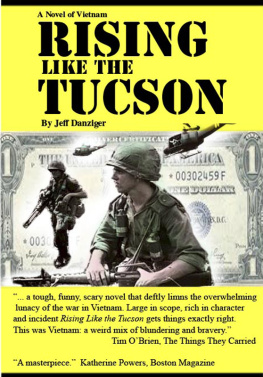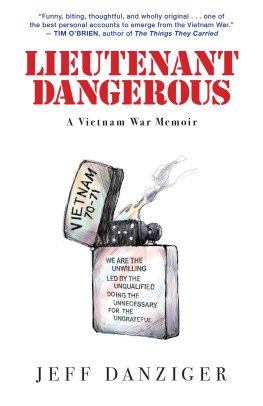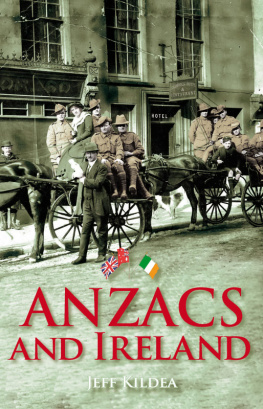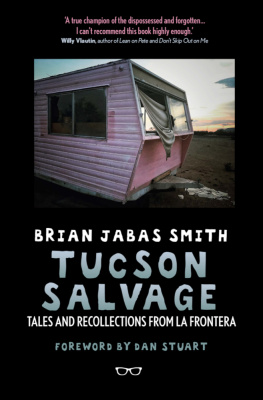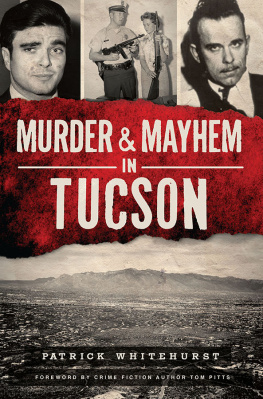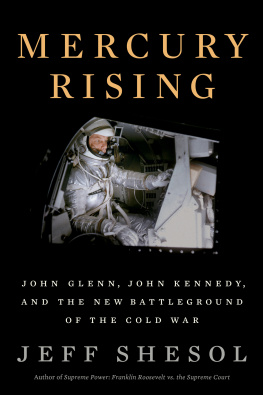Jeff Danziger - Rising like the Tucson
Here you can read online Jeff Danziger - Rising like the Tucson full text of the book (entire story) in english for free. Download pdf and epub, get meaning, cover and reviews about this ebook. City: New York, year: 1991, publisher: Doubleday, genre: Detective and thriller. Description of the work, (preface) as well as reviews are available. Best literature library LitArk.com created for fans of good reading and offers a wide selection of genres:
Romance novel
Science fiction
Adventure
Detective
Science
History
Home and family
Prose
Art
Politics
Computer
Non-fiction
Religion
Business
Children
Humor
Choose a favorite category and find really read worthwhile books. Enjoy immersion in the world of imagination, feel the emotions of the characters or learn something new for yourself, make an fascinating discovery.
- Book:Rising like the Tucson
- Author:
- Publisher:Doubleday
- Genre:
- Year:1991
- City:New York
- Rating:4 / 5
- Favourites:Add to favourites
- Your mark:
- 80
- 1
- 2
- 3
- 4
- 5
Rising like the Tucson: summary, description and annotation
We offer to read an annotation, description, summary or preface (depends on what the author of the book "Rising like the Tucson" wrote himself). If you haven't found the necessary information about the book — write in the comments, we will try to find it.
Rising like the Tucson — read online for free the complete book (whole text) full work
Below is the text of the book, divided by pages. System saving the place of the last page read, allows you to conveniently read the book "Rising like the Tucson" online for free, without having to search again every time where you left off. Put a bookmark, and you can go to the page where you finished reading at any time.
Font size:
Interval:
Bookmark:

PUBLISHED BY DOUBLEDAY
a division of Bantam Doubleday Dell Publishing Group, Inc.
666 Fifth Avenue, New York, New York 10103
DOUBLEDAY and the portrayal of an anchor with a dolphin
are trademarks of Doubleday, a division of
Bantam Doubleday Dell Publishing Group, Inc.
Excerpt from Safire's Political Dictionary: The New Language of Politics by William Safire, copyright 1978 by William Safire, reprinted by permission of
Random House, Inc.
"Different Drum" by Michael Nesmith copyright 1965, 1967 Screen Gems-EMI Music Inc. All rights reserved. International copyright secured. Used by
permission.
All of the characters in this book are fictitious, and any
resemblance to actual persons, living or dead, is purely
coincidental.
Library of Congress Cataloging-in-Publication Data
Danziger, Jeff.
Rising like the Tucson / Jeff Danziger.
p. cm.
1. Vietnamese Conflict, 1961-1975Fiction. I. Title.
PS3554.A584R57 1991 91-7496
813'.54dc20 CIP
ISBN 0-385-41866-3
BOOK DESIGN AND ORNAMENTATION BY CAROL MALCOLM
Copyright 1991 by Jeff Danziger
ALL RIGHTS RESERVED
PRINTED IN THE UNITED STATES OF AMERICA
SEPTEMBER 1991
1 3 5 7 9 10 8 6 4 2
FIRST EDITION
FOR
MY
FATHER
"Vietnamizationa plan for the extrication of U. S. ground forces from Vietnam, with the concurrent buildup of South Vietnamese forces, so as to provide the South Vietnamese people with what President Nixon called 'a reasonable chance for survival.' "
William Safire
Safire's Political Dictionary:
The New Language of Politics
PART
O
N
E

TOUCHHOLE
Lieutenant Starret lay with his face in the dirt, pretending he was dead.
The dirt smelled bad. In fact, it stank. You never knew where latrines had been moved in these artillery bases, or how many times. He might have his nose pressed down in soil previously used as a latrine. That was something to think about. But if he were supposed to be dead, what would he care what things smelled like? He wasn't supposed to be breathing, was he? And if the North Vietnamese saw him breathing, they would shoot him. So what was the problem?
Firebase Touchhole was being overrun. Something had gone wrong with the intelligence. Something had gone wrong with the radio relays. Something had gone wrong with all of the things that were supposed to arrange for the defense of Firebase Touch-hole. Touchhole was a lonely little place, Mown out of the jungle just months before. It had forty men and six guns. Not much.
When the fighting started in the late afternoon Starret saw some of his men killed, a sight that enraged him, and he fired madly into the trees with the others. No one seemed to have a good idea where the little bastards were. The artillery fired wildly. Starret and the rest of his men fired.
But where? Into the mass of trees that ringed the base? The trees were dark, dense. Mortars dropped out of the sky on Starret and his men and bullets crackled by. More of his men were shot. The light was failing, and the sky turned a dull red. The forest turned black. Then another barrage of mortars. Then a brief period of waiting. Then the North Vietnamese cut through what little fence there was around the firebase and invited themselves in.
Why weren't the radios getting through? Where, for Jesus' sake, were the gunships? What was going wrong? Murder them, that's what he'd do. Not the North Vietnamesethe fools at division headquarters. Fools! Inattentive fools. Like Lieutenant Kit, for example.
Starret wondered if Lieutenant Kit was the cause of all this. Maybe Kit had been left in charge of intelligence operations that night. Or maybe he was hiding. What a fool! God, he hated Kit just at this moment, and would kill him if he got out of here. Lieutenant Kit should not have been in Vietnam. If there were a right way to fight a war, Kit shouldn't have even been in the army. He certainly shouldn't have been an officer. The army had made a great many mistakes in its pursuit of a victory in Vietnam. Making Lieutenant Kit an intelligence officer was just one of them.
Endless mistakes. The mistakes in the late 1960s had built upon the mistakes in the early 1960s, all on top of one another, so that the war teetered like a rotten tree waiting to fall. But nobody knew when it was going to fall or which way it was going to fall. Lieutenant Starret was not schooled in history, and he could not judge the staying power of wars. But if you could believe Lyndon Johnson, and if Richard Nixon were any guide, the thing must end!
Yet the war went on. Starret had led his men well for six months, bringing to his command a creativity and carefulness his men appreciated. Six months is a long time in a war. They appreciated Starret's sense of his own survival. He did not get reckless. He did not yearn for medals. Some lieutenants wanted to take no prisoners, but Starret wanted to take no chances. No decorations and no perforations. He was a rare finda careful officer. His men loved him. At least they didn't try to kill him, and for officers that counted as love in this war.
But no matter how careful he had been, after six months, his sense of survival had grown into a solid, continuing dread. At last he had opted himself out of the war. Lyndon Johnson had done the same thing. And no one was shooting at him. And now Nixon was opting out, and if Nixon could do it, Starret decided, while playing dead on Firebase Touchhole, he could do it, too. Regardless of the consequences, if he weren't discovered playing dead here and killed, then he, William Starret, first lieutenant of the 1st of the 27th Infantry, had no further interest in the war. Certainly it had no interest in him.
Shooting bounced around among the bunkers on Firebase Touchhole and bullets pinged off the howitzers themselves. It was the scariest kind of fighting, crawling around in the red dirt in the dying light of the afternoon, looking for someone to kill.
Starret had crawled over to an ammunition trailer where he saw two other Americans huddled, with the hope that he could make some sort of position out of it. When he got there he discovered they were dead.
There was a lull in the firing, and he heard men running. He heard Vietnamese voices coming closer. Several voices. He dropped his rifle and lay facedown next to the dead soldiers.
He lay there for a few minutes getting used to playing dead, breathing slowly. Then he opened one eye and peeked out. He could see small figures darting about in the dark. Occasional shots were fired. What could those shots be? Were they running around shooting the wounded Americans, perhaps? How amusing. He closed his eye again and lay there listening, smelling the stinking dirt.
He heard footsteps, shuffling footsteps. He held his breath and lay rock still. The footsteps were coming closer. He cautiously drew in air and held it. Perhaps, he thought, this wasn't such a good idea after all. The shuffling footsteps came closer yet. They came right beside him. Whoever it was kicked Starret.
I am dead, Starret thought. Leave me alone.
A rifle muzzle sniffed around among the dead men and Lieutenant Starret. Starret wanted to open his eyes. Plenty of dead men lay with their eyes open. His lungs were bursting, searching through the air they held for any remaining oxygen.
He could breathe in, he told himself in a small, squeaky internal voice, and risk being shot through the back of his neck, or he could hold his breath further and commit suicide by self-asphyxiation. Or he could jump up and knock over the North Vietnamese. Or maybe be shot before he could get up. His mind raced through the options over and over, hundreds of times. In ten seconds more he would act or be dead. He began to count backwards.
Next pageFont size:
Interval:
Bookmark:
Similar books «Rising like the Tucson»
Look at similar books to Rising like the Tucson. We have selected literature similar in name and meaning in the hope of providing readers with more options to find new, interesting, not yet read works.
Discussion, reviews of the book Rising like the Tucson and just readers' own opinions. Leave your comments, write what you think about the work, its meaning or the main characters. Specify what exactly you liked and what you didn't like, and why you think so.

